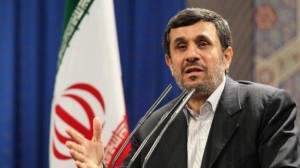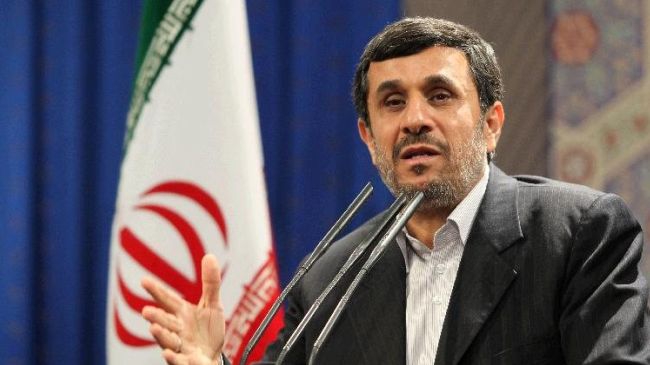
TEHRAN, Iran (AP) -- With words of defiance, Iran announced two nuclear-related projects Tuesday that expand capabilities to extract and process uranium - modest advances in Tehran's atomic efforts but ones symbolic of its refusal to slow nuclear work even as talks with world powers over the disputed program remain deadlocked.
The twin sites reflect Tehran's goal of greater self-sufficiency through the entire nuclear fuel cycle from uranium mines to enrichment labs.
Yet the timing - just days after the latest round of negotiations ended again in stalemate - reinforces a broader suggestion that Iran plans to push ahead with nuclear projects even at the potential risk of threatening the dialogue with U.S. and other envoys.
It also could amplify questions about Iran's commitment to the talks - which have, for the moment, hushed earlier talk among its adversaries about military options - and embolden calls by some U.S. lawmakers for even tougher sanctions.
Iran's gambit appears built around its drive for formal acknowledgment from Washington and other capitals of its "right" to enrich uranium, the process to make nuclear fuel. Iran, in tandem, wants the West to pull back on sanctions in exchange for some nuclear compromises.
The West and its allies, however, seek to rein in Iran's nuclear efforts and fear that the enrichment program could one day produce material for atomic weapons.
Iran says it only seeks nuclear reactors for energy and medical use. But the tone from Iranian President Mahmoud Ahmadinejad was taunting on Tuesday to mark the anniversary of Iran's first uranium enrichment in 2006.
"You could not block our access to nuclear technology when we didn't have it. How can you take it from our hands now that we have it?" he said, addressing the West.
"Iran has gone nuclear," he added, reiterating past declarations that Iran has comprehensive nuclear expertise. "Nobody will be able to stop it ... Cooperation with the Iranian nation is the best solution for you."
In Jerusalem, U.S. Secretary of State John Kerry repeated that Washington remained "open to negotiation" within limits. He later called the expanded uranium work "not constructive."
"But it is not open-ended, endless negotiation," he said following talks with Israeli Prime Minister Benjamin Netanyahu, whose nation has warned it could consider military strikes against Iranian nuclear sites. "It cannot be used as an excuse for other effort to try to break out with respect to a nuclear weapon."
Kerry added: "President (Barack) Obama could not be more clear: Iran cannot have and will not have a nuclear weapon."
Mounting nuclear threats from North Korea, meanwhile, have only added to international worries about allowing the Iranian dialogue to drift indefinitely.
"I think everybody understands that Iran is running out the clock, has been using the talks to continue to advance its nuclear programs," Netanyahu said, citing the reports of two new uranium sites in Iran.
Neither represents breakout technology. Iran already has uranium mines and the ability to turn the raw ore into a material called yellowcake, which is the first step in the enrichment chain.
But the new facilities - expansion in the country's largest uranium mine and processing facility - give Tehran greater access and control in making the raw materials for enrichment to nuclear fuel and, potentially, for warhead-grade material.
State TV simultaneously showed ceremonies at Iran's biggest uranium mine at Saghand and a uranium ore concentrate production plant in Ardakan, both in central Iran.
Saghand consists of an open pit with a deep mine reached by two shafts of more than 335 meters (1,100 feet), according to the official IRNA news agency. The mine has a reported capacity of 132,000 tons of uranium ore per year.
The Ardakan Yellowcake Production Plant is Iran's industrial-scale facility that turns ore into concentrate, also known as yellowcake, the feedstock for enrichment. IRNA said the plant is capable of producing 66 tons of yellowcake. About 200 tons is needed to produce enough nuclear fuel to run an energy-producing reactor - similar to Iran's lone reactor in the Persian Gulf port of Bushehr - for a year, nuclear experts say.
Iranian nuclear scientist Hossein Afarideh claimed the country has "already achieved proficiency in the entire nuclear fuel cycle," but said the expanded uranium capabilities helps "stabilize Iran's nuclear technology."
In London, British Foreign Secretary William Hague told reporters that Britain has not given up on the talks, but would not rule out further sanctions.
"It isn't helpful at all in this process for Iran to make new announcements in the nuclear field," Hague said.
Iran also has a considerable stock of yellowcake acquired from South Africa in the 1970s under the former U.S.-backed shah's original nuclear program. It also has other supplies of yellowcake obtained from China before U.N. sanctions came into effect.
"These announcements weren't about game-changers as far as Iran's nuclear program. They are political messages after the last failed round of talks," said Theodore Karasik, a security and political affairs analyst at the Dubai-based Institute for Near East and Gulf Military Analysis. "It's Iran saying, `We are not slowing down and this has to be taken into account in the talks.'"
There is no date set to resume the dialogue between Iran and the six-nation group - the five permanent U.N. Security Council members plus Germany - after last week's round in Kazakhstan failed to break the impasse.
But Tuesday's announcement brought some parallels with past talks that also failed to gain ground. In December 2010, on the eve of negotiations in Geneva with the same six-nation group, Iran said it was producing yellowcake for the first time.
Kerry, too, drew connections between broken agreements by North Korea over uranium enrichment and Iran's new uranium sites as both "provocative."
"To open up yellowcake production and to make any step that increases the rapidity with which you move toward enriched fissile material raises the potential of questions, if not even threat, and I think that is not constructive," Kerry told reporters before leaving Israel.
Earlier, Ahmadinejad defiantly said Iran has already achieved proficiency in nuclear technology, which is now "in the hearts, minds and elbows of our scientists."
By The Associated Press
The Iran Project is not responsible for the content of quoted articles.











